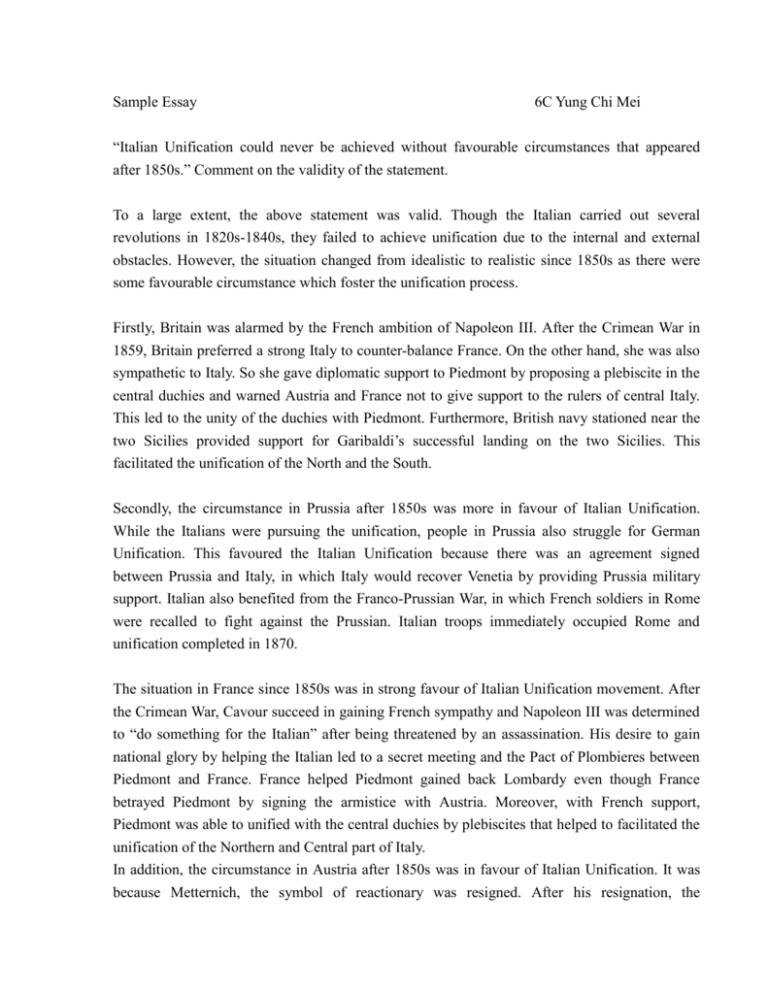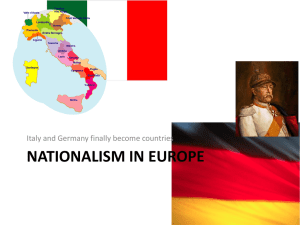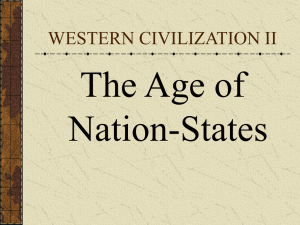Sample Essay
advertisement

Sample Essay 6C Yung Chi Mei “Italian Unification could never be achieved without favourable circumstances that appeared after 1850s.” Comment on the validity of the statement. To a large extent, the above statement was valid. Though the Italian carried out several revolutions in 1820s-1840s, they failed to achieve unification due to the internal and external obstacles. However, the situation changed from idealistic to realistic since 1850s as there were some favourable circumstance which foster the unification process. Firstly, Britain was alarmed by the French ambition of Napoleon III. After the Crimean War in 1859, Britain preferred a strong Italy to counter-balance France. On the other hand, she was also sympathetic to Italy. So she gave diplomatic support to Piedmont by proposing a plebiscite in the central duchies and warned Austria and France not to give support to the rulers of central Italy. This led to the unity of the duchies with Piedmont. Furthermore, British navy stationed near the two Sicilies provided support for Garibaldi’s successful landing on the two Sicilies. This facilitated the unification of the North and the South. Secondly, the circumstance in Prussia after 1850s was more in favour of Italian Unification. While the Italians were pursuing the unification, people in Prussia also struggle for German Unification. This favoured the Italian Unification because there was an agreement signed between Prussia and Italy, in which Italy would recover Venetia by providing Prussia military support. Italian also benefited from the Franco-Prussian War, in which French soldiers in Rome were recalled to fight against the Prussian. Italian troops immediately occupied Rome and unification completed in 1870. The situation in France since 1850s was in strong favour of Italian Unification movement. After the Crimean War, Cavour succeed in gaining French sympathy and Napoleon III was determined to “do something for the Italian” after being threatened by an assassination. His desire to gain national glory by helping the Italian led to a secret meeting and the Pact of Plombieres between Piedmont and France. France helped Piedmont gained back Lombardy even though France betrayed Piedmont by signing the armistice with Austria. Moreover, with French support, Piedmont was able to unified with the central duchies by plebiscites that helped to facilitated the unification of the Northern and Central part of Italy. In addition, the circumstance in Austria after 1850s was in favour of Italian Unification. It was because Metternich, the symbol of reactionary was resigned. After his resignation, the reactionary force of Austria was weakened and she was troubled with internal decline and revolutionary movement. Besides, Austria was internationally isolated for her mistaken policy in the Crimean War. Her reluctance to join with Russia cut off their diplomatic relations while she was isolated by France and Britain for her neutrality in the war. No wonder why the Great Powers offered no help for Austria during the Austro-Sardinia War in 1859. Apart from the favuorable international circumstances, the internal situation in the Italian states was also more in favour of the unification movement in 1850s. For examples, the rise of Cavour in 1850s helped strengthening Piedmont by reforms, which paved way for the Italian Unification. The agricultural reform helped improving agricultural production, banking and trade were expanded. There was an expansion of middle class who provided support to Italian Unification in the 1850s. The Pope’s influence in the unification movement was reduced since Cavour introduced reform to weaken the Church influence in politics and because of the failure of 1830 revolution, the Italian were convinced by the ineffectiveness of Federalism and they looked up to Piedmont for leadership. Militarily, Piedmont was strengthened by reform. As Cavour realized that war might be unavoidable. He also introduced large public works, such as roads and canals. All these helped preparing Piedmont for war. Cavour also signed commercial treaty with Britain to recruit capital and develop industry in Piedmont so as to ensure the leading position and foundation of Piedmont in the unification movement. Besides, Garibaldi’s campaign in the Southern Italy further accelerated the Italian unification movement. His conquer of the two Sicilies further aroused nationalism in the South Italian states and his handover of two Sicilies to Victor Emmanuel II helped preventing the outbreak of Civil War and led to the unification of the North and the South. Last, but not least, nationalism became a more important driving force than liberalism in 1850s and Italian learnt series of lessons from the failure of 1820, 1830 and 1848 revolutions. Their determination to drive out the Austrian domination with foreign aid became a clear objective for the whole movement. With Piedmont as unification leader, they were more united and striving their best towards the goal. In conclusion, it’s true that Italian could never achieve unification without favourable circumstance that emerged in 1850s. Even though they had strong determination, unification would be extremely difficult to achieve for Italians were not as strong as Austria and she was not able to overcome all her internal obstacles. With the changing international circumstance and internal situation that favour Italian movement after 1850s, they attained their goals in 1870.





